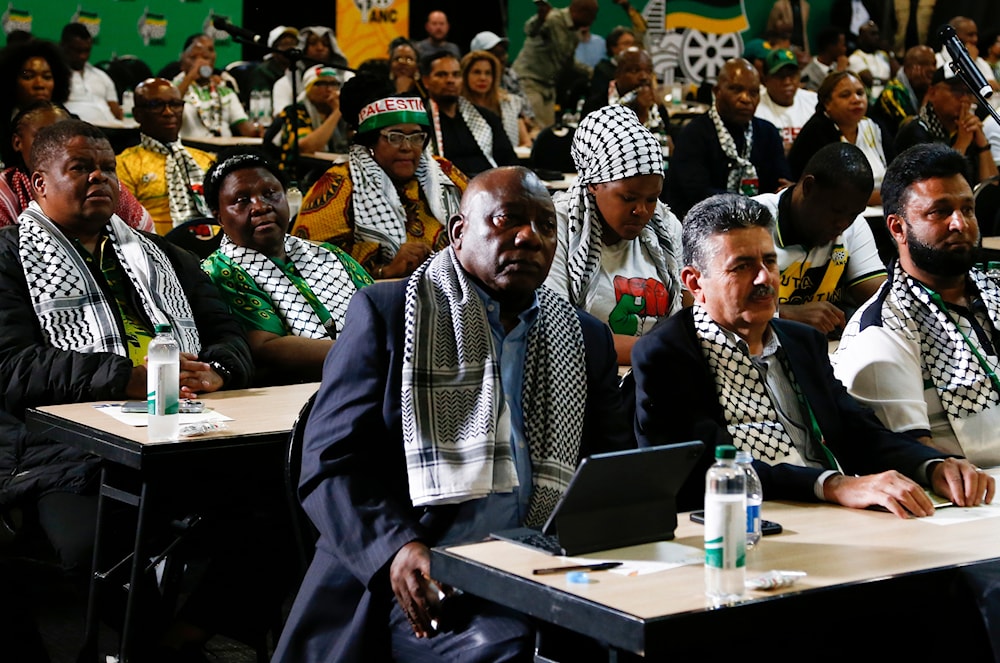UN Security Council to meet after ICJ ruling on Gaza
The United Nations Security Council is set to meet next week over the ICJ's decision calling for the Israeli occupation to prevent the commission of genocidal acts in Gaza.ICJ
-

South African President Cyril Ramaphosa, first row left, listens in Johannesburg, January 26, 2024, to the ruling from the International Court of Justice. (AP)
The United Nations Security Council is set to convene next week following a decision by the International Court of Justice (ICJ) urging the Israeli occupation to prevent the further commission of genocidal acts in Gaza, the UNSC's presidency said on Friday.
Algeria, who is heading the UNSC this month, initiated the meeting, asserting that it would enforce the "binding effect" of the ICJ's pronouncement on the provisional measures imposed on the Israeli occupation.
The ICJ, based in The Hague, declared on Friday that the Israeli regime must take measures to prevent genocidal acts amid its aggression on Gaza, and must also facilitate the entry of aid to the blockaded Strip.
"In order to do all the things that they are asking for, you need a ceasefire for it to happen," Palestinian Ambassador to the UN Riyad Mansour said.
Mansour went on to hint that the Arab group, represented in the council by Algeria, would push for a ceasefire after the ICJ failed to do so.
The UNSC has seen limited agreement on resolutions that have been brought up in the wake of the Israeli aggression on Gaza.
Back in December, it called for aid deliveries "at scale" to the war-afflicted, besieged population of Gaza, but there has not been a call for a ceasefire that has not been vetoed.
The United States has been resisting calls for a ceasefire despite mounting international pressure, contributing to more and more deaths by the day.
'Genocide Convention'
The ICJ's verdict for now was for the Israeli occupation to "prevent the commission of all acts within the scope" of the 1948 Genocide Convention.
The UN's top court ordered that some rights presented by South Africa in its genocide case against the Israeli war on Gaza are plausible.
As the reading proceeded, the court recognized the right of Palestinians in Gaza to be protected from acts of genocide, adding that the Palestinians are a protected group under the genocide convention. However, the ruling does not deal with the core accusation of the case - whether genocide occurred - but focuses on the urgent intervention sought by South Africa.
Among the measures South Africa requested was an immediate halt to the Israeli military operation, which has laid waste to much of the enclave and killed more than 26,000 Palestinians, according to Gaza health authorities.
The Court ordered "Israel" to take all measures to prevent genocide acts in Gaza, ensure its forces do not commit genocide, and take measures to improve the humanitarian situation.
"Israel" is required to submit a report to the court within a month, detailing its actions to comply with the order. Furthermore, it must implement measures to prevent and punish direct incitement of genocide in the context of its war on Gaza.
"The state of Israel shall.... take all measures within its power to prevent the commission of all acts within the scope of Article II of the Genocide Convention," the court said.
Overwhelming opposition to 'Israel'
15 of the 17-judge panel of the ICJ voted in favor of urgent measures, addressing most of South Africa's requests, though notably excluding an order for "Israel" to cease military actions in Gaza.
South Africa submitted a motion to the International Court of Justice on December 29, 2023, accusing Israeli forces of violating the UN's Genocide Convention. South Africa's submission to the Hague-based court reads that the Israeli occupation forces [IOF] operations "are genocidal in character, as they are committed with the requisite specific intent to destroy Palestinians in Gaza as a part of the broader Palestinian national, racial, and ethnical group."
The International Court of Justice has the authority to issue "provisional measures," emergency orders aimed at safeguarding Palestinians in Gaza from potential breaches of the convention. These orders are legally binding and cannot be appealed, though enforcing them poses a challenge.
On December 29, "Israel" rejected South Africa's launch of a genocide case against it at the ICJ. Despite the sea of war crime evidence, the occupation labeled the case as groundless blood libel lacking legal merit and asserted that its army was adhering to international humanitarian law.
On that note, Israeli Prime Minister Benjamin Netanyahu has hinted that his government might not adhere to any ICJ order, stating, "No one will stop us – not The Hague, not the Axis of Evil, and no one else," referring to the Axis of Resistance.

 5 Min Read
5 Min Read








